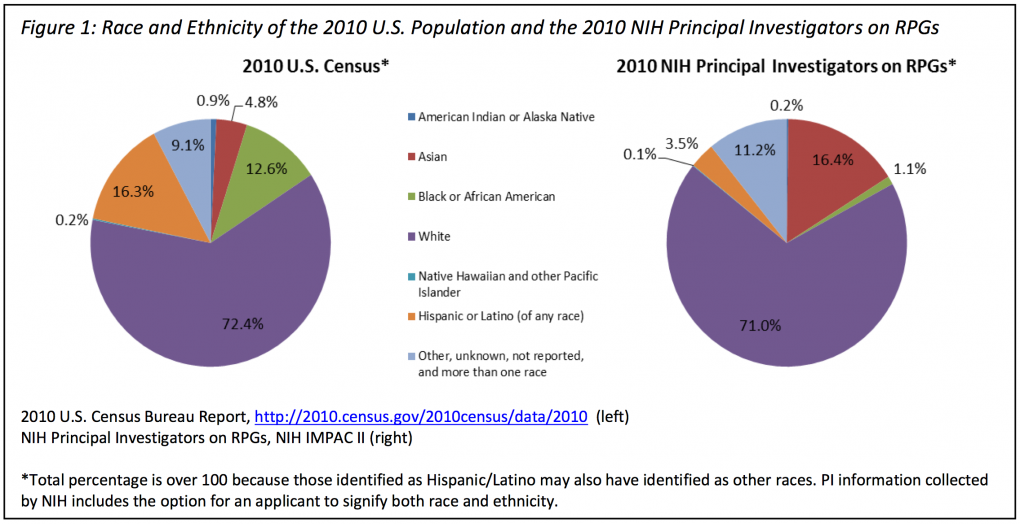Challenge Implicit Bias in Honor of MLK Day
Today, we honor Dr. Martin Luther King Jr.’s legacy by observing his message and his impact on society. Simply put, he believed that all people are equal and entitled to equal economic, political, and social rights regardless of race, gender, religion, nationality, sexual orientation, and any other categories that have been used to create divisions between people. Dr. King was the face of the Civil Rights Movement and instrumental in ending legalized racial segregation and securing voting rights for African-Americans. His message of human rights and social justice is as relevant today as it was 50 years ago.
You might wonder, “What does this have to do with the NIH? What does this have to do with me?”
The NIH greatly benefits from diversity and is very aware that many groups, including African-Americans, are under-represented among the senior leadership and principal investigators within the Intramural Program. Only 1.4% of Senior Investigators are African-American, 3.3% are Hispanic, and 20% are women. There are a number of complex and historical reasons why this is the case. NIH continues to be committed to diversity and is actively working to improve recruitment of underrepresented groups. In addition, it is aware of the need to retain and promote its most talented individuals, including women and underrepresented groups.

n the context of the 2010 U.S. Census, the percentages of Extramural NIH Principal Investigators in underrepresented groups awarded Research Project Grants (RPGs) closely mirror those of the IRP [source].
The Advisory Committee to the Director’s (ACD) Working Group on Diversity in the Biomedical Research Workforce recommends effective strategies to increase the representation of diverse individuals underrepresented nationally in biomedical research. The Office of Equity, Diversity, and Inclusion, among other things, translates demographic data into meaningful information that drives NIH’s equity and diversity initiatives. There are also affinity groups, such as the Society for the Advancement of Chicanos/Hispanics and Native American in Science (SACNAS), LGBT Fellows and Friends, and Network of African-American Fellows (NAAF), which help foster the success of their members.
While programs and policies can do a lot to reduce systemic barriers to fair representation of women and underrepresented groups at the NIH, we still have to do our part as individuals to support the efforts of NIH’s leadership. Dr. Michael Gottesman, Deputy Director for Intramural Research, reminds us, “It is up to everyone at NIH to make sure we have the most hospitable, inclusive environment for all of our scientific staff.” In order to fully do this we must address our implicit biases.
Thanks to Dr. King and people like him, most people don’t consciously believe in racism or sexism. The unconscious mind has been harder to change, though. You may have heard of the study where two almost identical CVs, differing only in name, were shopped around for a job. The CV with the male name was rated higher in competence and more likely to be hired. The male was also offered a higher salary. This is an example of the consequences of implicit bias. In other news, R01 grant applications are less likely to be funded when submitted by an African-American investigator. The ACD Diversity Working Group Subcommittee on Peer Review is conducting studies to understand why such funding disparities may occur, and unconscious bias is one possibility.
The employers in the gender study were not intentionally hindering the success of the female applicant. Rather, like these studies have shown, attitudes and beliefs held unconsciously and shaped by societal stereotypes often affect a person’s behavior. It is important to recognize our implicit biases and keep them in mind when making decisions, because then we can begin to act based on our chosen beliefs rather than the unconscious ones. To test yourself and learn about your possible biases in particular areas, you can take the Project Implicit assessment in 10-15 minutes.
“Rarely do we find men who willingly engage in hard, solid thinking,” Dr. King once said. “There is an almost universal quest for easy answers and half-baked solutions. Nothing pains some people more than having to think.” While that may be true in general, I don’t think he was speaking of the men and women at NIH who routinely and vigorously engage in “hard, solid thinking.” Surely, we can continue to strive to create and nurture an inclusive environment that attracts and retains people from diverse backgrounds. So, in observance of MLK Day, let’s become aware of our implicit biases (and their consequences) and challenge those unconscious biases that inhibit our ability to realize our diversity and inclusion ideals.
Related Blog Posts
This page was last updated on Wednesday, July 5, 2023
